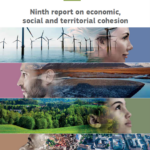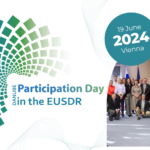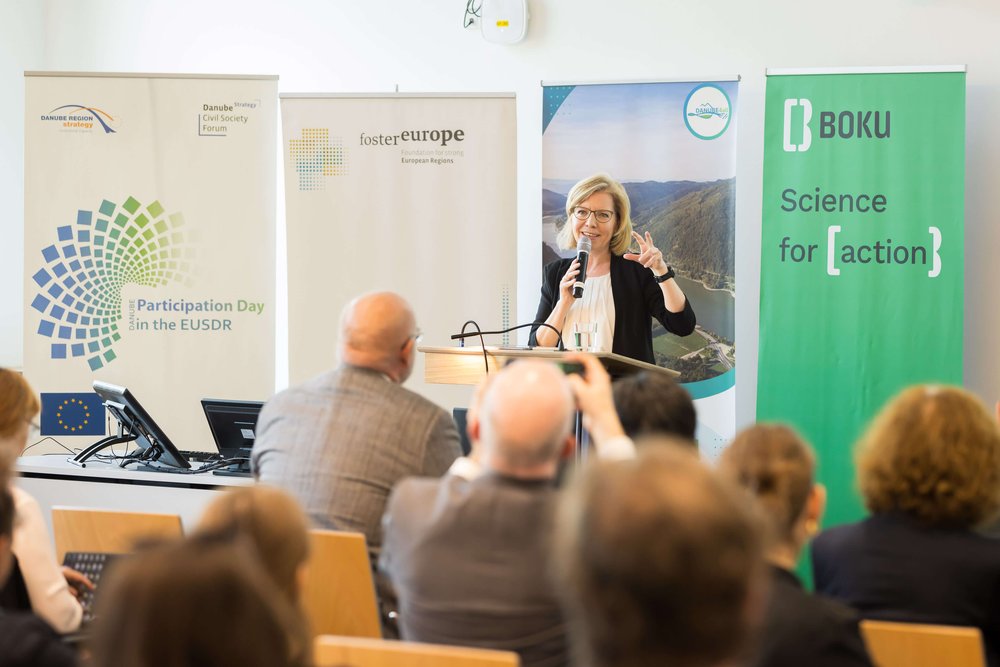PHOTO: FOSTER EUROPE WEBSITE
On Tuesday, April 9, international experts and stakeholders from 21 nations gathered at the BOKU Water Engineering Laboratory to discuss pressing water management issues in the Danube Basin.
As climate change progresses, droughts and floods are becoming more frequent and may even occur simultaneously throughout the Danube region. This poses dangers for new conflicts over water in the heart of Europe. Leonore Gewessler, Austrian Minister for Climate Protection, emphasised the need for collaborative efforts to address these challenges and for bridging the gap between the scientific community and political sphere. She highlighted the importance of hearing scientific voices in policy making and recognising different roles and tools in the proccess. To do so there is a need to balance interests to draft and implement legislation as these are different realities and environments that are being operated in. Finally, a proper framework and cooperation facilitates working together with different stakeholders. Although there is still work to be done the Minister also highlighted the EU Danube Strategy as a best practice example of such cooperation, aiming to develop scenarios and concepts for a sustainable strategy in water management from the mountains to the Danube Delta.
An overarching European water management approach is sought to balance conflicting interests and ensure continuous water supply for people, the environment, and the economy across the entire Danube region. Over 115 million people and unique ecosystems depend on water management strategies. Stefan Lütgenau from the Foster Europe Foundation stressed the importance of involving directly affected stakeholders, scientists, and civil society in shaping future strategies.
The impacts of climate change are already evident, with altered annual and seasonal water flows, including intense rainfall events and drought periods. Helmut Habersack, Head of the Institute of Hydraulic Engineering and River Research at BOKU, pointed out the challenges users will face with changing water quantities and qualities, affecting livelihoods and infrastructure.
The recommendations from the Waters 2040 expert roundtable encompass various aspects:
Extreme Events and Climate Change
- Expanding integrated flood and drought risk management
- Improving and implementing spatial planning regulations for damage mitigation
- Prioritizing natural solutions over purely technical measures
- Enhancing water retention and groundwater recharge through river renaturation
- Protecting and restoring floodplains
Biodiversity and Water Quality
- Implementing natural solutions in catchments and river landscapes
- Restoring habitats and ecological connectivity through natural measures and technical innovations
- Reducing soil erosion and nutrient transport through best agricultural practices
- Utilizing innovative monitoring concepts for targeted management of surface and groundwater systems
- Implementing integrated river basin management plans and comprehensive action programs
Energy Sector and Navigation
- Implementing measures and technologies to improve hydropower and ecology
- Ensuring energy security in relation to wind and solar energy
- Enhancing navigation conditions through joint technical and ecological measures
- Developing the Danube waterway through innovative structures and flexible infrastructure
Co-Creation, Co-Design, and Citizen Science
- Developing methods applicable for practical, cross-sectoral use and decision-making
- Applying co-creation and co-design methods in all major projects in the Danube region
- Providing Citizen Science tools for data collection and involvement along the Danube
- Linking technical, natural, and social science methods to improve citizen participation in projects
The EU Danube Strategy aims to deepen the existing transnational dialogue with various stakeholders to create an action framework that considers all implementation levels. In the coming years, collaboration between science, politics, administration, civil society, and the economy is crucial to develop concepts and nature-based solutions. The organisers offer their support to the EU Danube Strategy for implementing these recommendations.
In conclusion, the Waters 2040 Participation Day Austria underscores the urgency of collaborative action in addressing water management challenges in the Danube Basin, ensuring a sustainable future for generations to come.




